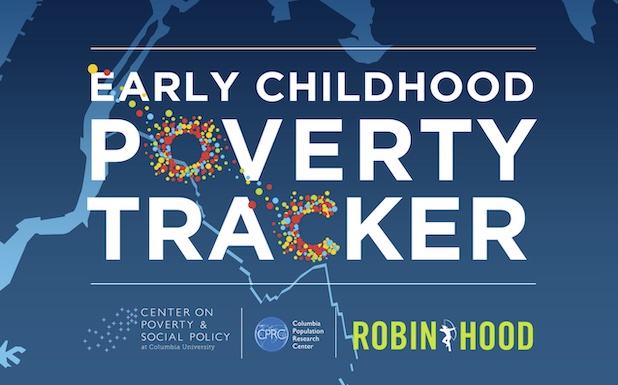Jul 29, 2021 Press Release
New Robin Hood Report: NYC's Child Care System in Dire Need of Reform
Child care is unaffordable for 52% of New York City families; the cost amounts to nearly 50% of a full-time minimum wage worker’s salary.

NEW YORK, NY – Robin Hood, in collaboration with Columbia University, released a new report today that analyzes the barriers to child care in New York City and highlights the need for reform to ensure an inclusive economic recovery from the COVID-19 pandemic. The Early Childhood Poverty Tracker’s “Child Care, Affordability, Accessibility and the Costs of Disruptions Report” found that child care was unaffordable for 52% of New Yorkers and, prior to the pandemic, would have cost half the annual salary of a full-time worker earning minimum wage. Lack of affordable child care also impacts New York City’s economy with child care disruptions costing the City an estimated $1.28 billion annually because of work absences and turnover related to child care.
Access to quality, affordable child care also has an impact on children’s physical and mental well-being, preparedness for school and long-term economic mobility. The pandemic has only exacerbated these problems. Without adequate federal support, New York City risks losing half of its already constrained child care supply, which will result in even greater disruptions.
“Every day, parents in New York City have to choose between going to work or taking care of their kids due to a lack of accessible and affordable child care options. Child care is critical for our youngest New Yorkers’ development and their parents’ and caretakers’ ability to join the workforce and provide for their families, but too many New Yorkers are left without quality, affordable child care options in their communities,” said Sarah Oltmans, Robin Hood’s Chief of Grant Strategy. “The pandemic showed that child care isn’t a luxury. It’s a prerequisite—for a sustained economic recovery today and a stronger city tomorrow.”
Key findings include:
- 52% of New York City families paid more than 7% of their income (the federal affordability standard) for child care, including 56% of lower-income families and 48% of higher income families.
- Full-time child-care would cost nearly 50% of a full-time minimum wage worker’s salary, making it nearly impossible for low-income workers to afford.
- Only about one in four income-eligible families received government assistance to help pay for child care. Insufficient funding, lack of awareness and administrative uncertainty may prevent eligible families from accessing assistance.
- According to data from the Center for American Progress, seven out of ten New York City children aged zero to four lived in “child care deserts,” or neighborhoods without enough licensed child care providers. Families living in child care deserts were less likely to use a licensed provider than families in better-supplied neighborhoods. COVID-19 exacerbated these problems, making it even more difficult for families to find child care that met their needs and their budgets.
- Children in lower income families were less likely to be in nonparental child care than children in higher-income families. However, across all families, there were disparities in child care usage by income. Children in lower-income families were less likely to be in nonparental child care than children in higher income families. And in families where the mother did not work, child care was almost twice as common among higher income families (50%) as in lower-income families.
- Latinx children were less likely than children of other race or ethnic backgrounds to be in nonparental care.
- Over a 12-month period, 30% of working parents reported experiencing a child care disruption that hindered their work advancement.
- Child care issues cause New York City businesses to lose nearly $1.2 billion annually because working parents are absent from their jobs or experience job turnover. These disruptions decrease city and state tax revenue by more than $135 million annually.
This report leverages data from the Early Childhood Poverty Tracker, a Columbia University and Robin Hood study of more than 1,500 parents of young children in New York City. The study provides a window into how families — especially low-income parents — managed their child care needs before the pandemic and what happens when families experience disruptions. Robin Hood, in conjunction with the Century Foundation and Next100, recently released a policy agenda that provides actionable policy recommendations for how the next mayor of New York City can better support the City’s child care landscape. Read it here.
About Robin Hood:
Robin Hood has been fighting poverty in New York City since 1988. Because Robin Hood’s board covers all overhead, 100% of every donation goes directly to the poverty fight. Last year, Robin Hood awarded $172 million in grants, filling a critical void during the COVID-19 pandemic by providing cash assistance, meals, housing, healthcare, education, and other urgent needs to one million New Yorkers impacted by COVID-19, as well as funding an array of programs and initiatives developed to elevate families out of poverty in New York City. Follow the organization on Twitter @RobinHoodNYC and learn more at www.robinhood.org.
About the Center on Poverty and Social Policy (CPSP):
The Center on Poverty and Social Policy at the Columbia School of Social Work produces cutting-edge research to advance our understanding of poverty and the role of social policy in reducing poverty and promoting opportunity, economic security, and individual and family-wellbeing. The Center’s work focuses on poverty and social policy issues in New York City and the United States.
About Columbia Population Research Center (CPRC):
The Columbia Population Research Center supports population health researchers across Columbia University, galvanizing new interdisciplinary and cross-campus collaborations, promoting the professional development of junior scientists, and enabling members to do work that is more innovative and impactful. Our members’ interests encompass four primary research areas: Children, Youth, and Families; Reproductive Health and HIV/AIDS; Immigration/Migration; and Urbanism, with cross-cutting attention to inequalities and policies to mitigate those inequalities.